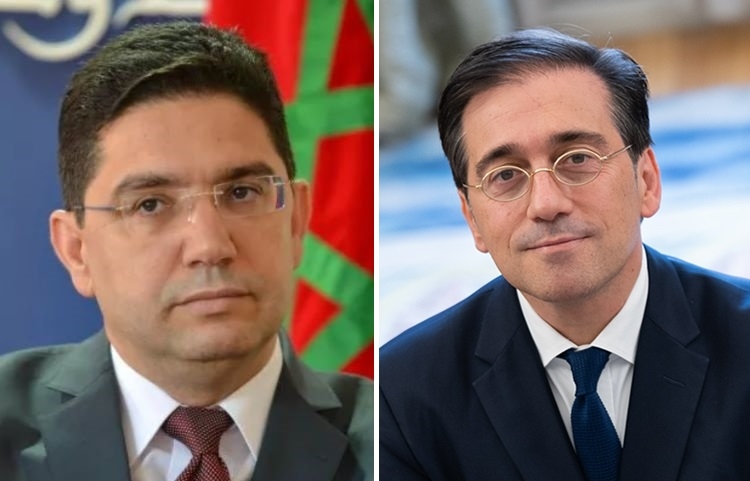The Diplomat
The Minister of Foreign Affairs, José Manuel Albares, will hold today a bilateral meeting with his Moroccan counterpart, Naser Bourita, on the occasion of his presence at the meeting of the Global Coalition against Daesh, to be held tomorrow in Marrakech.
As reported by the Ministry in a press release, the two ministers “will review various issues on the bilateral and international agenda, as well as the evolution of the roadmap established between the two countries”. According to the Government’s agenda, the meeting will be held in Marrakech at eight o’clock in the evening, according to local time (one hour later in mainland Spain).
The following day, the two ministers will participate in the meeting of the Global Coalition against Daesh, the first to be held in an African country and in which, according to Foreign Affairs, the minister will address the Spanish proposal to focus efforts to defeat terrorism in Africa. The Global Coalition against Daesh, which was formed in September 2014 at the NATO Wales Summit, has 80 countries and five international organizations under the umbrella of the United Nations. Spain has been part of the Coalition since its creation.
Albares has not yet met with Bourita since he took office in July 2021, in the midst of a bilateral diplomatic crisis. Following the decision of Pedro Sánchez’s government to accept the autonomy plan for Western Sahara, and the consequent normalization of relations, the two ministers agreed on a first meeting in Rabat, which was cancelled at the last minute, on March 31, after King Mohamed VI invited the Spanish Prime Minister to pay an official visit to Morocco to stage the new stage and launch the new roadmap.
Albares accompanied Sánchez on this trip, but did not have the opportunity to have a quiet conversation with his Moroccan counterpart, with whom he has spoken on several occasions by telephone in recent months to try to put bilateral relations back on track. The first telephone conversation since the outbreak of the crisis took place at the end of September 2021, and on that occasion both ministers pledged to hold “a face-to-face meeting soon”, a meeting that never materialized. Albares and Bourita are set to play a key role in the coming months, as it will be up to them to coordinate the working groups that are scheduled to be set up in different sectors with a view to holding the postponed High-Level Meeting (HLM), initially scheduled for December 2020, before the end of the year.
“Satisfied” with the roadmap
Precisely, the minister assured yesterday during a press conference with his Portuguese counterpart, João Gomes Cravinho, at the Viana Palace in Madrid, that he was “satisfied” with the pace at which the roadmap established last April 7 in Rabat by Sánchez and Mohamed VI is being developed. “Everything is progressing at its pace,” he assured. “A roadmap has a time to develop and we want to do things gradually, orderly, without pause but without urgency,” he continued.
At the moment, he recalled, last week already met in Rabat the Hispano-Moroccan Joint Commission for the preparation of the Strait Crossing Operation (OPE) and the Permanent Hispano-Moroccan Group on Migration and is waiting for the meeting of the group on delimitation of maritime borders, which has been “fifteen years without meeting”. According to Albares, everything is developing “with total normality” and the maritime and air connection between Spain and Morocco “has been totally normalized and ports such as Tarifa or Algeciras have returned to normality after almost two and a half years”. As for migratory cooperation, he assured, “it is confirmed on the ground, with pronounced drops” in the Atlantic route, where the arrivals to the Canary Islands “have fallen by 45%”. Likewise, migratory pressure has also dropped in Ceuta and Melilla and the Andalusian coasts.
The activation of the roadmap has coincided with allegations of Morocco’s possible involvement in the spying on Pedro Sánchez and the Minister of Defense, Margarita Robles. In this regard, Albares stated last week that “international relations are not based on conjecture or speculation, they are based on facts” and, therefore, “the first thing is to clarify the facts and then the decisions that have to be taken, if any, will be taken, but as Minister of Foreign Affairs I am not going to enter into conjecture about any country”.







